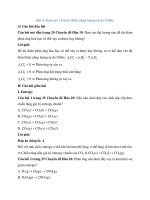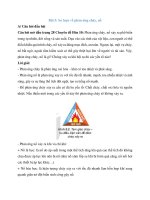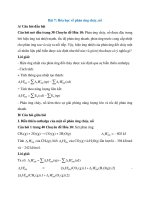Đề thi thử môn tiếng anh 2022
Bạn đang xem bản rút gọn của tài liệu. Xem và tải ngay bản đầy đủ của tài liệu tại đây (77.85 KB, 6 trang )
BỘ GIÁO DỤC VÀ ĐÀO TẠO
ĐỀ CHUẨN MINH HỌA 33
(Đề thi có 05 trang)
KỲ THI TỐT NGHIỆP TRUNG HỌC PHỔ THƠNG NĂM 2022
Bài thi: NGOẠI NGỮ; Mơn thi: TIẾNG ANH
Thời gian làm bài: 60 phút không kể thời gian phát đề
--------------------------
Họ, tên thí sinh…………………………………………………………………………………………
Số báo danh: ...........................................................................................................................................
Mark the letter A, B, C or D to indicate the correct answer to each of the following questions.
Question 1. An unexpected surge in _______ power caused the computer to crash.
A. electricity
B. electrical
C. electrically
D. electrify
Question 2. His welcoming speech wasn’t good, _______ ?
A. wasn’t it
B. was he
C. was it
D. wasn’t he
Question 3. Children and parents should be concerned about _______ knowledge of growing vegetables and
raising pets.
A. bridging
B. taking
C. acquiring
D. voicing
Question 4. Regrettably, the popularity of this lake with tourists has contributed _______ its pollution.
A. with
B. to
C. of
D. for
Question 5. The children had to _______ in the principal’s office after they took part in a fight.
A. hit the right notes
B. beat around the bush
C. play second fiddle
D. face the music
Question 6. He couldn’t perform well in his recent test _______ his anxiety.
A. though
B. due to
C. because
D. in spite of
Question 7. Tim sold his _______ bicycle to have enough money for his favourite handheld electronic game.
A. German new black
B. black new German
C. new black German
D. German black new
Question 8. She hated her father for leaving, for _______ to the disease when he should have fought it.
A. putting off
B. calling off
C. giving in
D. cutting in
Question 9. When we came in, they _______ the meal for us.
A. prepare
B. preparing
C. prepared
D. were preparing
Question 10. By the time he finishes his speech, I _______ for over one hour.
A. will have slept
B. have slept
C. am sleeping
D. sleep
Question 11. The sight of his pale face brought _______ to me how ill he really was.
A. place
B. house
C. life
D. home
Question 12. The visit to my old school _______ an early memory of my favourite teacher, Mr. Bell.
A. honour
B. jog
C. trigger
D. repress
Question 13. A lot of young people don’t know how the Internet _______.
A. invents
B. has invented
C. invented
D. was invented
Question 14. _______ from the disease, she’s more aware of the importance of taking regular
exercise.
A. Having recovered
B. Recover
C. To recover
D. Being recovered
Question 15. The more time you spend on social media, _______ you feel.
A. the most isolated
B. more isolated
C. the more isolated
D. as isolated as
Mark the letter A, B, C, or D to indicate the sentence that best completes each of the following exchanges.
Question 16. Mr David is having dinner with his friend in a restaurant.
- Mr David: “Could you bring me some water?”
- Waiter: “____________”
A. No, thanks.
B. Of course you can.
C. I’m afraid not.
D. Certainly, sir.
Question 17. Woodley and Leonard are at the airport.
- Woodley: “Thank you for giving me a lift to their airport.”
- Leonard: “Don’t mention it. _______”
A. You’re better now.
B. Be confident.
C. It’s the least I can do.
D. Have you heard their story?
Mark the letter A, B, C, or D to indicate the word that differs from the other three in the position of the
primary stress in each of the following questions.
Question 18. A. renovate
B. recommend
C. modernize
D. simplify
Question 19. A. produce
B. market
C. urban
D. report
Mark the letter A, B, C, or D to indicate the word whose underlined part differs from the other three in
pronunciation in each of the following questions.
Question 20. A. wicked
Question 21. A. plane
B. mixed
B. hand
C. needed
C. bat
D. learned
D. lack
Mark the letter A, B, C or D to indicate the word(s) CLOSEST in meaning to the underlined word(s) in each
of the following questions.
Question 22. In 1985, the Coca-Cola Company altered the secret formula of the drink’s ingredients.
A. modified
B. proposed
C. enriched
D. restore
Question 23. Due to the foot-and-mouth pandemic, the company was forced to reappraise its strategy.
A. reapply
B. reconsider
C. remind
D. recall
Mark the letter A, B, C or D to indicate the word(s) OPPOSITE in meaning to the underlined word(s) in
each of the following questions.
Question 24. The whole country is up in arms about the new tax the government has imposed on books.
A. worried
B. angry
C. excited
D. passive
Question 25. Arguing with David is futile; he’ll never accept that he was wrong.
A. pointless
B. modern
C. fruitful
D. stupid
Mark the letter A, B, C, or D to indicate the sentence that best combines each pair of sentences in the
following questions.
Question 26. She had only just begun to speak when people started interrupting.
A. Only when she hardly had begun to speak did people start interrupting.
B. Hardly had she begun to speak when people start interrupting.
C. Hardly had she begun to speak when people started interrupting.
D. No sooner did people start interrupting than she began to speak.
Question 27. Joe is not here with us. He will know how to fix this technical issue.
A. Provided that Joe is here with us, he won’t know how to fix this technical issue.
B. Joe will know how to fix this technical issue even if he is not here with us.
C. We wish Joe were here with us and fixed this technical issue.
D. If only Joe were here with us help fix this technical issue.
Mark the letter A, B, C or D to indicate the underlined part that needs correction in each of the following
questions.
Question 28. Last year, my parents earn a modest income and were unable to send me to public school.
A. earn
B. income
C. to send
D. public
Question 29. Participating in teamwork activities helps students develop our social skills.
A. in
B. activities
C. helps
D. our
Question 30. He was so exhausted that he felt asleep at his desk.
A. so
B. exhausted
C. felt asleep
D. at
Mark the letter A, B, C, or D to indicate the sentence that is closest in meaning to each of the following
questions.
Question 31. I’m certain that Johny used his smartphone in the exam as he finished it in just 5 minutes.
A. Johny can’t have used his smartphone in the exam as he finished it in just 5 minutes.
B. John needn’t have used his smartphone in the exam as he finished it in just 5 minutes.
C. Johny might have used his smartphone in the exam as he finished it in just 5 minutes.
D. Johny must have used his smartphone in the exam as he finished it in just 5 minutes.
Question 32. “I’m sorry I’ve stained your new blouse,” said Olivia.
A. Olivia apologized for having stained my new blouse.
B. Olivia admitted having stained my new blouse.
C. Olivia denied having stained my new blouse.
D. Olivia promised to have stained my new blouse.
Question 33. I haven’t gone to the cinema for ten years.
A. It was ten years ago I went to the cinema.
B. The last time I went to the cinema was ten years.
C. I last went to the cinema ten years ago.
D. It’s ten years I haven’t gone to the cinema.
Read the following passage and mark the letter A, B, C, or D to indicate the correct word or phrase that best
fits each the numbered blanks.
The knock-on effect of volunteering on the lives of individuals can be profound. Voluntary work helps
foster independence and imparts the ability to deal with different situations, often simultaneously, thus teaching
people how to (34) ________ their way through different systems. It therefore brings people into touch with the
real world; and, hence, equips them for the future.
Initially, young adults in their late teens might not seem to have the expertise or knowledge to impart to
others that say a teacher or agriculturalist or nurse would have, (35) ________ they do have many skills that can
help others. And in the absence of any particular talent, their energy and enthusiasm can be harnessed for the
benefit of their fellow human beings, and ultimately themselves. From (36) ________this, the gain to any
community no matter how many volunteers are involved is (37) ________.
Employers will generally look favorably on people (38) ________ have shown an ability to work as part of
a team. It demonstrates a willingness to learn and an independent spirit, which would be desirable qualities in
any employee.
Question 34. A. give
B. work
C. put
D. take
Question 35. A. so
B. but
C. or
D. for
Question 36. A. all
B. none
C.above
D. both
Question 37. A. unattainable
B. immeasurable
C. undetectable
D. impassible
Question 38. A. which
B. whose
C. who
D. what
Read the following passage and mark the letter A, B, C, or D to indicate the answer to each of the question.
Do you ever speak with your mouth full of food? Do you forget to cover your mouth with your hand when
you sneeze? If you are guilty of these ‘crimes’, then perhaps you should enrol on an Etiquete and Social Skills
course. This is not just an ordinary course. It’s a course in manners. You will have lessons in good manners and
how to behave in social situations.
The person who teachers these lessons is Maggie O’Farrill at the Petite Protocol School, and her students
are aged between six and twelve years old. She thinks this is the best time to teach kids. “At this age they are
very easy”, O’Farrill says. “When they get older, it’s harder for them to break bad habits. Children at this age
want to be polite. You can see that they’re trying. Maggie instructs the children to speak properly on the phone
and walk correctly, as well as telling them about basic table manners. These classes have become popular
because parents want well-behaved children but they are too busy to teach manners at home.
So, what do the children actually think of this course? The classes have proven to be popular with most of
the children, and the teachers at school have noticed that the youngsters are treating each other with more
respect. They also feel the skills they have learnt will be useful to them in the future.
Maggie O’Farrill herself believes that such skills can be life-changing. “We’ll have children growing up
who value manners. Maybe we’ll see a change in direction for the better in society”. That, however, remains to
be seen. Only time will tell.”
(Adapted from Upstream Level B1+ by Virginia Evans and Lynda Edwards)
Question 39. Which could be the best title for the passage?
A. Mind your manners
B. Say please and thank you
C. Bad habits start from childhood
D. Maggie’s dream
Question 40. The word “properly” in paragraph 2 is closest in meaning to _______ .
A. effortlessly
B. rightly
C. thoroughly
D. fascinatingly
Question 41. The word “they” in Paragraph 3 refer to _______ .
A. the classes
B. the teachers
C. the students
D. the skills
Question 42. According to paragraph 2, which of the following is stated regarding the Etiquette and Social
Skills Course?
A. Pupils at the Petite Protocol School range from toddlers to teenagers.
B. The teacher believes the children on the course are at an appropriate age for learning.
C. At the school, children learn to keep their elbows of the table when eating.
D. Parents don’t view manners as important as other home-skills.
Question 43. Which of the following is TRUE, according to the passage?
A. The course in manners has lead to successful breakthrough’s in society.
B. All participants of the course have found it worthwhile.
C. The course teaches children how to conduct themselves in everyday situations.
D. The teachers have noticed that the children on the course are more confident around their peers.
Read the following passage and mark the letter A, B, C, or D to indicate the answer to each of the question.
It is estimated that by 2050 more than two-thirds of the world's population will live in cities, up from
about 54 percent today. While the many benefits of organized and efficient cities are well understood, we need
to recognize that this rapid, often unplanned urbanization brings risks of profound social instability, risks to
critical infrastructure, potential water crises and the potential for devastating spread of disease. These risks can
only be further exacerbated as this unprecedented transition from rural to urban areas continues.
How effectively these risks can be addressed will increasingly be determined by how well cities are
governed. The increased concentration of people, physical assets, infrastructure and economic activities mean
that the risks materializing at the city level will have far greater potential to disrupt society than ever before.
Urbanization is by no means bad by itself. It brings important benefits for economic, cultural and societal
development. Well managed cities are both efficient and effective, enabling economies of scale and network
effects while reducing the impact on the climate of transportation. As such, an urban model can make economic
activity more environmentally-friendly. Further, the proximity and diversity of people can spark innovation and
create employment as exchanging ideas breeds new ideas.
But these utopian concepts are threatened by some of the factors driving rapid urbanization. For
example, one of the main factors is rural-urban migration, driven by the prospect of greater employment
opportunities and the hope of a better life in cities. But rapidly increasing population density can create severe
problems, especially if planning efforts are not sufficient to cope with the influx of new inhabitants. The result
may, in extreme cases, be widespread poverty. Estimates suggest that 40% of the world's urban expansion is
taking place in slums, exacerbating socio-economic disparities and creating unsanitary conditions that facilitate
the spread of disease.
The Global Risks 2015 Report looks at four areas that face particularly daunting challenges in the face
of rapid and unplanned urbanization: infrastructure, health, climate change, and social instability. In each of
these areas we find new risks that can best be managed or, in some cases, transferred through the mechanism of
insurance.
Question 44: The word “that" in paragraph 4 refers to __________.
A. urban expansion
B. socio-economic disparities
C. disease
D. unsanitary conditions
Question 45: According to paragraph 3, what is one of the advantages of urbanization?
A. It minimizes risks for economic, cultural and societal development.
B. It makes water supply system both efficient and effective.
C. Weather and climate in the city will be much improved.
D. People may come up with new ideas for innovation.
Question 46: Which statement is TRUE, according to the passage?
A. Urbanization brings important benefits for development as well.
B. 54% of the world's population will live in cities by 2050.
C. Risks cannot be addressed effectively no matter how well cities are governed.
D. Rapidly increasing population density can help solve poverty.
Question 47: The word "addressed" in paragraph 2 is closest in meaning to _________.
A. aimed at
B. dealt with
C. added to
D. agreed on
Question 48: What can be inferred from the passage?
A. Poverty may be a foregone conclusion of unplanned urbanization.
B. Diseases are caused by people migrating to cities.
C. Urbanization can solve the problem of environmental pollution in cities.
D. The increasing number of people in cities can create more employment.
Question 49: Which is the most suitable title for the passage?
A. The Risks of Rapid Urbanization in Developing Countries
B. Infrastructure and Economic Activities in Cities
C. The Global Risks 2015 Report on Developing Urban Areas
D. Rapid Urbanization Put Cities in Jeopardy
Question 50: The word “spark” in paragraph 3 is closest in meaning to ___________.
A. need
B. start
C. encourage
D. design
THE END









